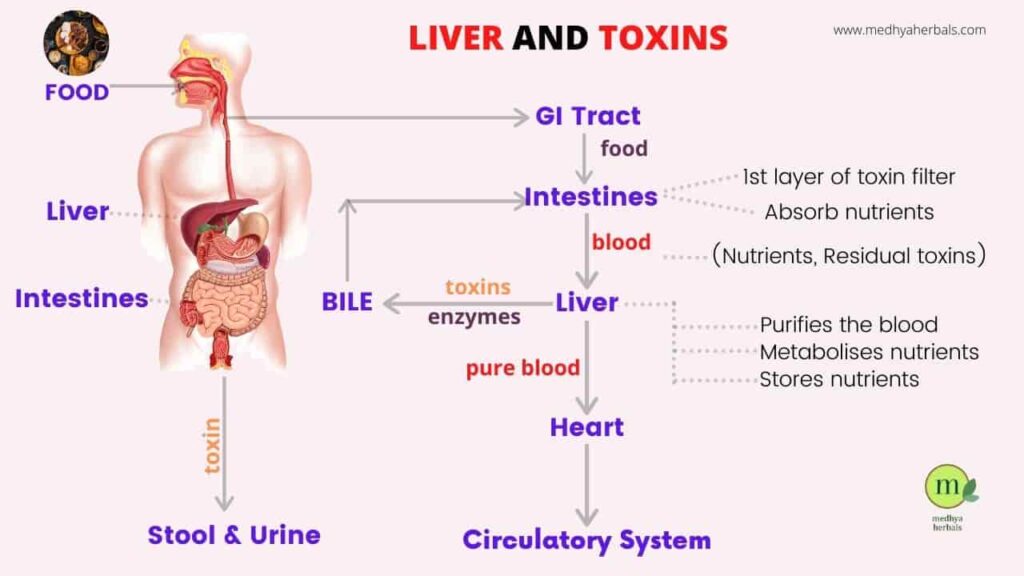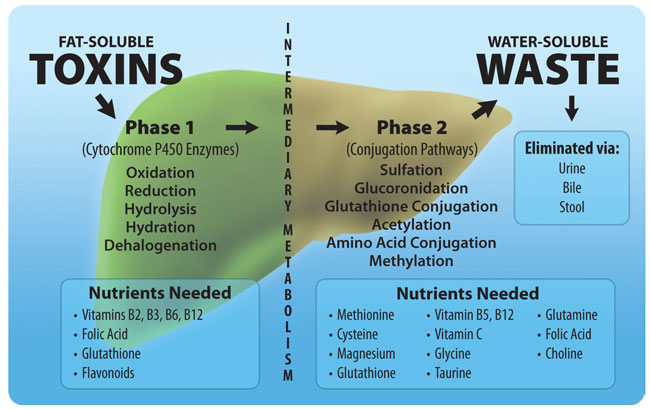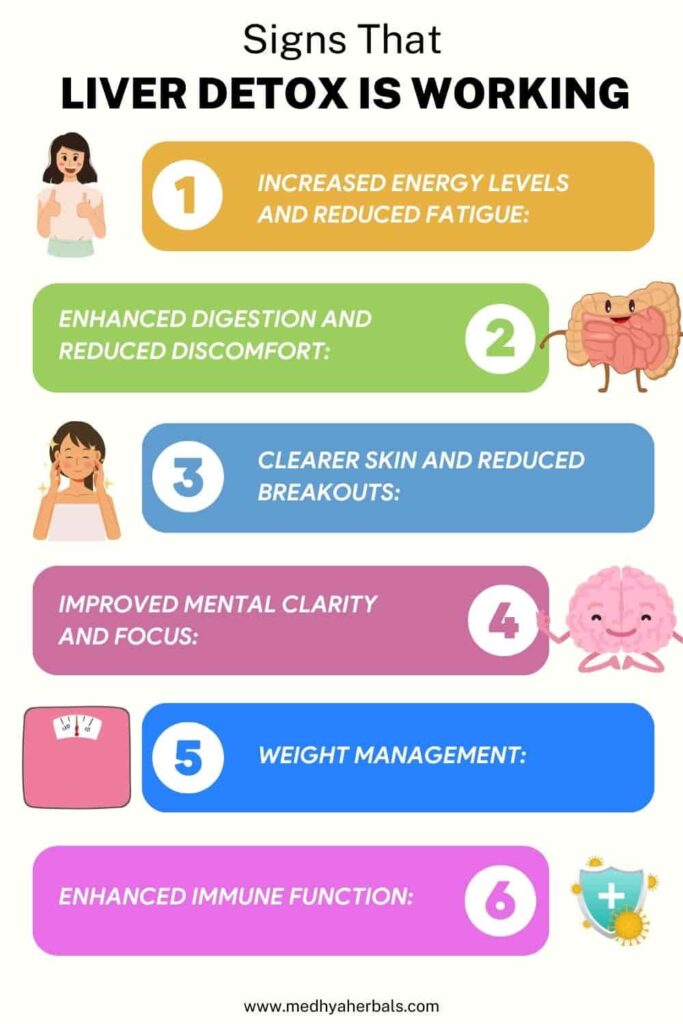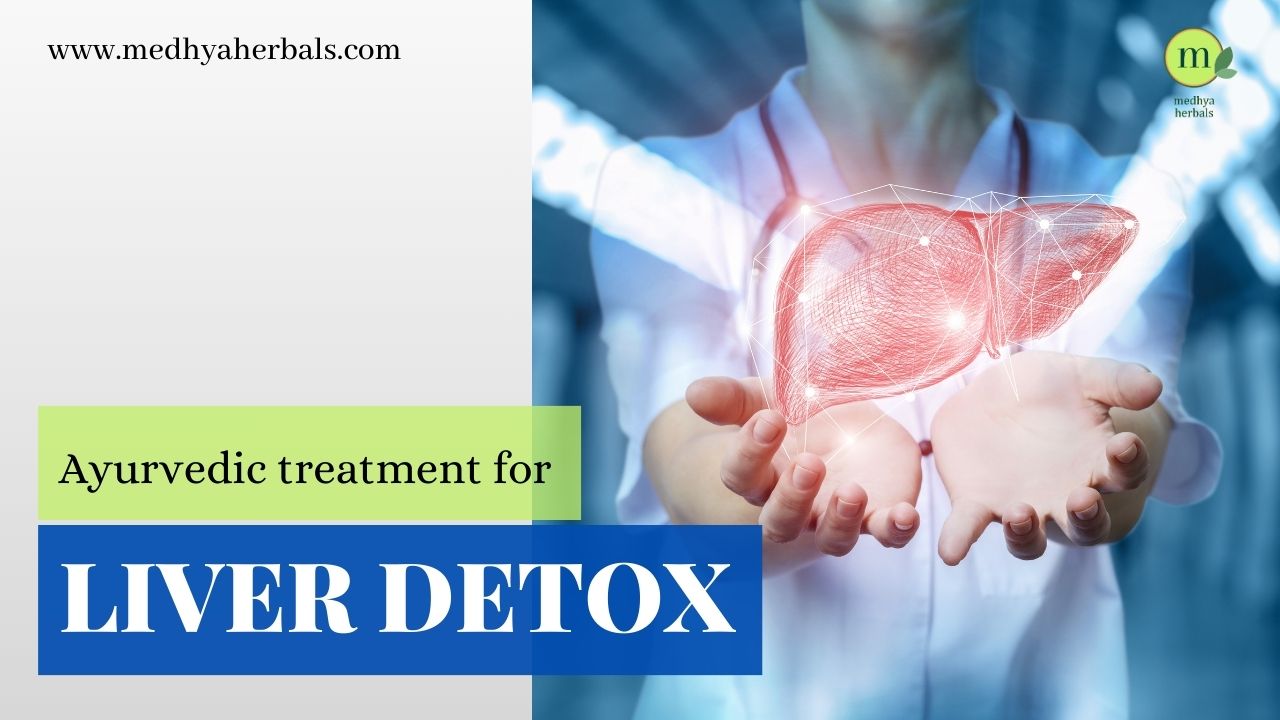Ever feel sluggish, experience unexplained fatigue, or battle persistent digestive issues? These symptoms, along with others like foggy thinking, stubborn breakouts, and even weight management struggles, can all point towards an underlying issue – a sluggish liver. This vital organ acts as your body’s natural detoxification center, working tirelessly to filter toxins, support digestion, and regulate various essential functions. But sometimes, due to factors like unhealthy habits and environmental toxins, our livers become overburdened, impacting their ability to function optimally.
This is where understanding the signs of liver detox becomes crucial. By recognizing the positive shifts your body experiences as your liver starts to thrive, you can gain valuable insights into the effectiveness of your efforts and stay motivated on your path to optimal health. In this informative guide, we’ll delve into the fascinating world of liver detox, explore the telltale signs that indicate your efforts are paying off, and empower you to support your body’s natural detoxification process for a healthier, more vibrant you.
What is Liver Detox?
Liver detoxification, also known as liver cleanse or liver detox, refers to the process by which the liver removes toxins and harmful substances from the body. The liver plays a crucial role in detoxification, as it is responsible for processing and eliminating these toxins, ensuring that the body remains healthy and free from harmful substances.

The Liver’s Role in Detoxification
The liver is the body’s largest internal organ and performs over 500 vital functions, including detoxification. One of the liver’s main functions is to filter blood coming from the digestive tract before passing it to the rest of the body. This process allows the liver to remove toxins, such as alcohol, drugs, and other harmful substances, from the bloodstream.
The liver detoxification process occurs in two main stages: Phase I and Phase II. In Phase I, enzymes in the liver chemically modify toxins to make them more water-soluble, preparing them for elimination. This process, called oxidation, reduction, or hydrolysis, creates intermediate compounds that can be more toxic than the original substance. However, Phase II detoxification quickly binds these intermediates to other molecules, making them less harmful and easier to eliminate from the body.

Stages of Liver Detoxification
- Phase I Detoxification: During this phase, enzymes, including cytochrome P450, modify toxins to make them more reactive and water-soluble. This step prepares the toxins for Phase II detoxification.
- Phase II Detoxification: In this phase, the reactive toxins from Phase I are further processed to become less harmful. This process involves conjugation, where molecules such as glutathione, amino acids, and sulfur are added to the toxins, making them water-soluble and easier to excrete.
- Elimination: Once the toxins are water-soluble, they are ready for elimination from the body. They are excreted through urine or bile into the intestines, where they are eventually eliminated through feces.
By understanding the liver’s role in detoxification and the stages involved, you can better appreciate the importance of maintaining a healthy liver and supporting its detoxification processes.
Liver Functions: Beyond Detoxification
The liver’s role goes far beyond simply removing toxins. It also performs a variety of essential functions crucial for optimal health:
- Nutrient Processing: The liver plays a key role in breaking down carbohydrates, proteins, and fats from food, ensuring their proper absorption and utilization by the body.
- Blood Sugar Regulation: The liver helps regulate blood sugar levels by storing excess glucose as glycogen and releasing it when needed for energy.
- Hormone Regulation: The liver plays a vital role in metabolizing and regulating various hormones, ensuring their proper balance in the body.
- Protein Synthesis: The liver produces many essential proteins, including those involved in blood clotting, immunity, and fluid balance.
The Need for Support: When Detox Becomes Necessary
Our modern lifestyles often put a strain on the liver’s detoxification capabilities. Factors like:
- Unhealthy Diet: A diet high in processed foods, sugary drinks, and unhealthy fats can overload the liver’s ability to process toxins.
- Alcohol Consumption: Excessive alcohol consumption can damage liver cells and hinder its detoxification function.
- Environmental Toxins: Exposure to pollutants like pesticides, herbicides, and air pollution can burden the liver.
- Medications: Certain medications can put stress on the liver and impair its function.
Signs that Liver Detox is Working
Let’s delve into the various signs that you may experience when your liver is functioning well and the lifestyle changes you undertake are having a positive impact:

Increased Energy Levels and Reduced Fatigue
Your liver acts as a metabolic powerhouse, playing a vital role in converting food into usable energy. When your liver is congested or overworked, you might experience tiredness, sluggishness, and a general lack of energy. As your liver function improves, you may notice a welcome surge in energy levels. You might find yourself waking up more refreshed, having greater stamina throughout the day, and feeling less prone to fatigue during your usual activities.
Enhanced Digestion and Reduced Discomfort
The liver produces bile, a crucial digestive fluid that helps break down fats and absorb nutrients. When liver function is suboptimal, you might experience digestive issues like bloating, gas, constipation, or diarrhea. Improved liver health can lead to smoother digestion, reduced discomfort, and a happier gut. You may notice more regular bowel movements, decreased feelings of heaviness after meals, and an overall improvement in your gastrointestinal well-being.
Clearer Skin and Reduced Breakouts
Your skin is often a reflection of your internal health, and your liver plays a key role in filtering toxins from the bloodstream. If your liver is overburdened, those toxins can manifest in the form of acne, rashes, eczema, or other skin problems. As your liver health improves, your body’s ability to eliminate toxins naturally enhances. This might translate into a clearer, more radiant complexion, reduced instances of breakouts, and an overall healthier glow.
Improved Mental Clarity and Focus
When toxins build up in your system due to compromised liver function, it can lead to feelings of “brain fog,” difficulty concentrating, and a general decline in cognitive function. A well-supported liver helps keep your body free from harmful substances, allowing for better mental focus, sharper thinking, and improved memory. You may find it easier to concentrate on tasks, have better recall, and experience an overall sense of mental alertness.
Weight Management
Efficient liver detoxification is closely linked to metabolic processes, which, in turn, play a role in weight management. If you observe gradual and sustainable weight loss without resorting to extreme measures, it indicates that your liver is aiding in the regulation of metabolism and supporting your overall weight management goals.
Enhanced Immune Function
A detoxified liver strengthens the immune system, contributing to a reduced susceptibility to illnesses and faster recovery. If you find yourself falling ill less frequently, experiencing shorter recovery times, and maintaining overall robust health, it suggests that your liver detox plan is bolstering your immune function.
Additional Positive Signs
Liver health optimization may bring about a host of additional benefits. You might notice reduced systemic inflammation, which can contribute to various health issues. Hormonal balance may improve, particularly for women, as the liver plays a role in metabolizing hormones. This can lead to a more regular menstrual cycle, reduced mood swings, and improved fertility. You might also experience indirect benefits like easier weight management due to a more efficient metabolism. Lastly, your immune system could get a boost as a healthy liver effectively filters out harmful bacteria and viruses.
It’s important to remember that these signs can vary from person to person, and other factors can also influence these positive changes. The most effective way to optimize liver health is by focusing on a healthy, balanced diet, regular exercise, adequate hydration, and stress management. If you have any concerns about your liver function, consult with a healthcare professional for personalized advice and guidance.
Side Effects of Liver Cleanse
Liver detoxification processes can occasionally cause side effects, especially if the body is eliminating toxins at a rapid rate or if the liver is overwhelmed. Common side effects of liver detox can include fatigue, headaches, nausea, and digestive issues such as bloating or diarrhea. These symptoms are often temporary and may indicate that the body is adjusting to the detox process. In some cases, individuals may also experience skin breakouts or mood swings as the body eliminates toxins. It’s important to note that severe or prolonged side effects should be addressed promptly and may require medical attention. It’s always advisable to consult with a healthcare professional before beginning any detox program to ensure it’s safe and appropriate for your individual health needs.
How to Reduce & Manage Side Effects of Liver Detox?
Managing the side effects of liver detox involves taking steps to support your body’s natural detoxification processes and alleviate discomfort. Here are some tips
- Stay Hydrated: Drink plenty of water to help flush out toxins and keep your body hydrated. Herbal teas and electrolyte-rich drinks can also be beneficial.
- Eat a Balanced Diet: Focus on whole, nutrient-rich foods that support liver health, such as fruits, vegetables, whole grains, and lean proteins. Avoid processed foods, alcohol, and excessive sugar and salt.
- Support Liver Health: Consider adding liver-supportive supplements or herbs to your diet, such as milk thistle, dandelion root, turmeric, or artichoke extract. These can help support liver function and ease detoxification.
- Manage Stress: Stress can impact liver function, so it’s important to find ways to manage stress levels. Practice relaxation techniques such as meditation, yoga, or deep breathing exercises.
- Get Adequate Rest: Allow your body to rest and recover during the detox process. Aim for 7-9 hours of quality sleep each night to support your body’s natural detoxification processes.
- Exercise Regularly: Engaging in regular physical activity can help support overall health and promote detoxification. Choose activities you enjoy, such as walking, yoga, or swimming.
- Monitor Symptoms: Keep track of any symptoms you experience during the detox process and consult with a healthcare professional if you have any concerns or if symptoms persist or worsen.
- Go Slow: If you’re experiencing severe side effects, consider slowing down the detox process or seeking guidance from a healthcare professional. It’s important to listen to your body and adjust your detox plan accordingly.
Lifestyle Tips to Detox Liver Naturally

Adopting a liver-friendly lifestyle can significantly contribute to the natural detoxification process and promote overall liver health. Here are some practical lifestyle tips to support liver detox:
- Hydrate Adequately: Staying well-hydrated helps the liver flush out toxins more effectively. Water supports the kidneys and ensures that waste products are efficiently eliminated from the body.
- Maintain a Balanced Diet: A nutritious diet provides essential nutrients for liver function. Incorporate foods rich in antioxidants, fiber, and vitamins to support detoxification processes.
- Limit Processed Foods and Sugar: Processed foods and excessive sugar can burden the liver. Opt for whole, unprocessed foods to reduce the intake of additives and support liver health.
- Consume Liver-Supportive Herbs: Certain herbs have liver-detoxifying properties. Including them in your diet or as supplements may help support liver function.
- Practice Portion Control: Excessive calorie intake can lead to weight gain and fatty liver disease. Practice portion control to maintain a healthy weight and reduce stress on the liver.
- Engage in Regular Exercise: Exercise supports overall health, including liver function. It helps burn excess fat, improves circulation, and promotes overall well-being.
- Limit Alcohol Consumption: Excessive alcohol can cause liver damage. Limiting alcohol intake or avoiding it altogether is crucial for liver health.
- Manage Stress: Chronic stress can impact liver function. Engaging in relaxation techniques helps manage stress levels, benefiting both mental and liver health.
- Ensure Adequate Sleep: Quality sleep is essential for the body’s overall regeneration and detoxification processes, including those related to the liver.
- Avoid Overuse of Medications: Excessive use of medications can strain the liver. Consult with a healthcare professional before prolonged or high-dose use of medications.
Incorporating these lifestyle tips into your daily routine can contribute to the health and well-being of your liver. As always, it’s advisable to consult with a healthcare professional before making significant changes to your diet or lifestyle, especially if you have existing health conditions.
Conclusion
We understand that navigating the complexities of liver health and detoxification can be overwhelming. You might have tried various approaches without finding lasting relief, leaving you feeling discouraged. However, here at Medhya Herbals, we believe in the power of Ayurveda, an ancient healing system that focuses on addressing the root cause of imbalances.
Our team of experienced Ayurvedic doctors can help you create a personalized treatment plan tailored to your unique needs. We’ll work with you to identify any underlying imbalances that might be contributing to your liver struggles and recommend a holistic approach that combines dietary and lifestyle modifications with the power of natural Ayurvedic herbs.
By taking a root-cause approach, we can empower you to achieve lasting and sustainable improvements in your liver health. Schedule a consultation with our Ayurvedic doctors today and embark on a journey towards a healthier, more vibrant you. Remember, a healthy liver is the foundation for overall well-being, and we’re here to support you every step of the way.
FAQ
How long does it take to detox a liver?
The duration it takes to detoxify the liver can vary based on individual health, lifestyle factors, and the specific detox methods employed. While there is no fixed timeline, a general liver detox program typically lasts anywhere from a few days to several weeks. Short-term detox plans may focus on dietary changes, emphasizing the consumption of liver-supportive foods, eliminating processed foods, and staying hydrated. More comprehensive detox programs may involve herbal supplements, such as milk thistle or dandelion root, and lifestyle modifications. It’s essential to approach liver detoxification with a sustainable, long-term mindset, incorporating healthy habits that support liver function over time. Before initiating any detox program, consulting with a healthcare professional is advisable to ensure it aligns with individual health needs and goals.
What are the three worst things for your liver?
The liver, a vital organ responsible for processing and filtering substances from the blood, can be adversely affected by certain lifestyle choices. Excessive alcohol consumption ranks among the foremost contributors to liver damage, leading to conditions like alcoholic liver disease and cirrhosis over time. Consuming a diet high in processed foods, saturated fats, and added sugars can contribute to non-alcoholic fatty liver disease (NAFLD), a prevalent liver condition. Additionally, exposure to toxins, whether through environmental pollutants, certain medications, or overconsumption of dietary supplements, can strain the liver’s detoxification capabilities. These three factors—excessive alcohol intake, poor dietary choices, and exposure to toxins—emerge as some of the most detrimental influences on liver health, emphasizing the importance of adopting a liver-friendly lifestyle for overall well-being.
What are the first physical signs of liver damage?
The first physical signs of liver damage can manifest subtly and may initially go unnoticed. Early symptoms often include fatigue, weakness, and a general sense of malaise, which can be attributed to the liver’s reduced ability to store and release energy. As liver damage progresses, individuals may experience abdominal discomfort or swelling due to fluid retention, a condition known as ascites. Jaundice, characterized by yellowing of the skin and eyes, may also develop as bilirubin, a waste product normally processed by the liver, accumulates in the bloodstream. Other early signs may include unexplained weight loss, loss of appetite, and digestive issues such as nausea or vomiting. Recognizing and addressing these initial physical signs of liver damage is crucial for early intervention and management of liver health. If experiencing any of these symptoms, it’s essential to seek medical attention promptly for proper evaluation and treatment.
What is the fastest way to repair your liver?
The fastest way to support liver repair involves adopting a holistic approach that combines dietary modifications, hydration, and lifestyle changes. Begin by eliminating or significantly reducing alcohol intake, as alcohol can contribute to liver damage. Focus on a nutrient-rich diet that includes plenty of fruits, vegetables, whole grains, and lean proteins. Incorporate liver-supportive foods such as leafy greens, beets, and berries, known for their antioxidant properties. Hydration is crucial, so ensure you’re drinking an adequate amount of water to aid in the flushing out of toxins. Regular exercise helps promote overall health and can support liver function by reducing fat accumulation. Additionally, consider incorporating liver-supportive supplements, such as milk thistle or turmeric, after consulting with a healthcare professional. Minimizing exposure to environmental toxins and managing stress through activities like meditation or deep breathing further contribute to a comprehensive strategy for expedited liver repair. However, it’s crucial to consult with a healthcare professional before making significant lifestyle changes to ensure they align with individual health needs and conditions.
When should I be worried about my liver?
Concerns about liver health should arise when certain symptoms persist or worsen over time. Persistent fatigue, unexplained weight loss, or a noticeable decrease in appetite could indicate underlying liver issues. Jaundice, characterized by yellowing of the skin and eyes, is a significant cause for concern and should prompt immediate medical attention. Abdominal pain or swelling, especially when accompanied by tenderness in the upper right abdomen, can be indicative of liver problems. Dark urine, pale-colored stools, and chronic digestive issues like nausea or vomiting may also signal liver dysfunction. If any of these symptoms persist, it is crucial to seek prompt medical evaluation, as early detection and intervention can significantly impact the prognosis and management of liver conditions. Additionally, individuals with a history of alcohol abuse, viral hepatitis, or other risk factors for liver disease should be vigilant about monitoring their liver health and consulting with healthcare professionals if concerns arise.
Reference
- Role of the Liver in Women’s Health: https://www.ncbi.nlm.nih.gov/pmc/articles/PMC5897118/
- The Role of the Liver in Energy Metabolism: https://pubmed.ncbi.nlm.nih.gov/24692138/
- Skin Manifestations of Liver Disease: https://pubmed.ncbi.nlm.nih.gov/25755383/
- Detoxification myths debunked: https://pubmed.ncbi.nlm.nih.gov/10895516/

